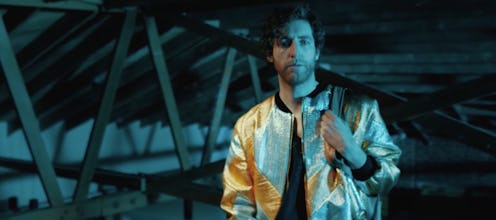Entertainment
This Short Film Could Be The Future of Sci-Fi

Could the future of films involve artificial intelligence? If the short film Sunspring is to act as any sort of barometer, then the answer is a mighty "yes." Written entirely by an AI, Sunspring could be indicative of the future of sci-fi. The boundaries of the genre were pushed forward massively by director Oscar Sharpe and his collaborator Ross Goodwin in making Sunspring. Working together for Sci-Fi London's 48-Hour Film Competition, the men followed the prime directive to put together a competition-quality film in 48 hours. What resulted was Sunspring, a nine-minute film that is enjoyably odd to watch. That's all down to the screenwriter, Benjamin and his magical screenwriting sensibilities.
Now, before we start worrying whether machines have become totally sentient, Benajmin's writing process was not entirely from his own techno-brain. Rather, Benjamin was fed a massive list of sci-fi screenplays from the '80s and '90s, picking each one apart to find common words or phrases and forming an entirely new script from them. What resulted what a grammatically-correct if not slightly weird script. Benjamin's script got the big green light and Sharpe turned his words into movie magic. What makes Sunspring really come to life is the work being done by its three main characters: H (Thomas Middleditch), C (Humphrey Ker) and H2 (Elizabeth Gray). These three character who may or may not be co-workers caught in a love triangle are tangoing with some tricky lines (e.g. "We're going to see the money.") and weaving their own motives, emotions and body language into a script that is rife with beautifully constructed nonsense.
What interests me is not only the resulting film (it's really a marvelous short film) but the mechanics of it. Yes, the lines may not make much sense, but what's written is some of the most interesting dialogue I've heard onscreen. It recalls the enigmatic nonsensicality of Samuel Beckett. It's poetic, technical, and simple. It's the kind of dialogue that says everything and nothing, forcing viewers to engage. Take a few lines from H2's monologue at the end: "He was going to be late. I was going to be a moment," or, "He looks at me and throws me out of his eyes." What does it mean? Is she speaking about H or C? Either way, the emotions that come through from her words are visceral and real.
Which leaves me wondering whether Sunspring is indicative of what is possible for the future of the sci-fi film. It's a beguiling film genre to take on. Part science, part reality, and often part fantasy, sci-fi has given birth to films that challenge our sense of what is possible. We can imagine new worlds, remodel our own into an idealized (or dystopian) vision and even use sci-fi as social and political commentary. This makes sci-fi a perfect genre for cinema, a medium the demands the best uses of imagination to become realized. The use of AI in facilitating a new way to structure dialogue, stage directions and setting could be a key to not only reimagining what is possible for film, but for creating a new artistic approach to screenwriting. "Artistically challenging" is an idea many would believe is necessary to push a medium like cinema forward. I tend to fall into this camp because why shouldn't art (and specifically cinema) be an evolving creature? Why shouldn't a screenplay evolve in the way it could be fundamentally structured? Change is a good thing, folks.
Watch Sunspring and decide for yourself whether AI should be given another chance to write the next great sci-fi screenplay.
Images: Ars Technica Videos/YouTube (2)